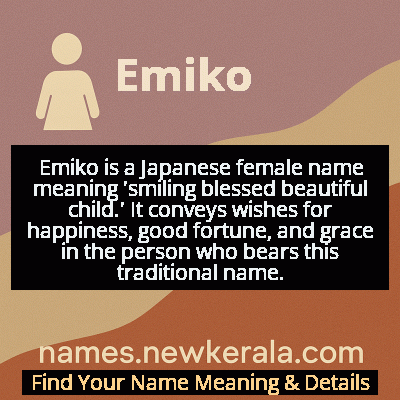Emiko Name Meaning & Details
Origin, Popularity, Numerology Analysis & Name Meaning of Emiko
Discover the origin, meaning, and cultural significance of the name EMIKO. Delve into its historical roots and explore the lasting impact it has had on communities and traditions.
Name
Emiko
Gender
Female
Origin
Japanese
Lucky Number
8
Meaning of the Name - Emiko
Emiko is a Japanese female name meaning 'smiling blessed beautiful child.' It conveys wishes for happiness, good fortune, and grace in the person who bears this traditional name.
Emiko - Complete Numerology Analysis
Your Numerology Number
Based on Pythagorean Numerology System
Ruling Planet
Saturn
Positive Nature
Ambitious, efficient, realistic, and authoritative.
Negative Traits
Materialistic, stressed, confrontational, and can be overly ambitious.
Lucky Colours
Dark blue, black.
Lucky Days
Saturday.
Lucky Stones
Blue sapphire, amethyst.
Harmony Numbers
2, 4, 6.
Best Suited Professions
Business leaders, managers, financial services, law enforcement.
What People Like About You
Leadership, determination, organizational skills.
Famous People Named Emiko
Emiko Miyamoto
Actress
Starred in numerous Japanese films including 'The Burmese Harp' and 'Floating Clouds'
Emiko Ōkuyama
Politician
First female mayor of Sendai City and prominent political figure in modern Japan
Emiko Yamauchi
Singer
Popular enka singer known for her emotional ballads and traditional Japanese music
Emiko Kaminuma
Academic
Renowned astrophysicist and professor at University of Tokyo specializing in galaxy formation
Name Variations & International Equivalents
Click on blue names to explore their detailed meanings. Gray names with will be available soon.
Cultural & Historical Significance
The name's cultural significance extends beyond mere aesthetics to encompass deeper social values. In Japanese society, where group harmony and positive social presentation are highly valued, a name meaning 'smiling blessed beautiful child' carries expectations of bringing joy and maintaining pleasant relationships. Historically, names like Emiko were often chosen by families wishing to express their hopes for their daughter's future – that she would be fortunate, attractive, and contribute positively to her community. The name also reflects the Japanese concept of 'kawaii' (cuteness) as a social virtue and the importance of maintaining a cheerful disposition as a way of showing respect and consideration for others.
Extended Personality Analysis
Women named Emiko are typically associated with a warm, gracious personality that combines traditional elegance with modern resilience. They often possess a natural charm and emotional intelligence that makes them excellent communicators and valued friends. The 'smiling' aspect of their name's meaning frequently manifests as an optimistic outlook and ability to find silver linings in challenging situations. Emikos are usually perceptive and empathetic, able to understand others' perspectives while maintaining their own grounded center. Their 'blessed' quality often translates into a sense of gratitude and appreciation for life's gifts, making them positive influences in their social circles.
In professional and personal relationships, Emikos tend to be diplomatic and thoughtful, preferring harmony over conflict. They often excel in creative fields, education, or roles requiring strong interpersonal skills. Despite their gentle exterior, many Emikos demonstrate remarkable inner strength and determination when pursuing their goals. The 'beautiful child' aspect of their name doesn't necessarily refer to physical beauty alone but often reflects an inner beauty characterized by kindness, integrity, and emotional authenticity. They typically balance traditional values with contemporary independence, creating a unique blend of respect for heritage and forward-thinking adaptability that serves them well in both personal growth and social contributions.
Modern Usage & Popularity
In contemporary naming practices, Emiko has evolved from its peak popularity in mid-20th century Japan to become a classic, traditional choice that carries nostalgic appeal. While it's no longer among the most popular names for newborn girls in Japan, it maintains a steady presence and is often selected by parents seeking a name with cultural depth and elegant simplicity. The name has experienced some international adoption, particularly in Western countries where Japanese culture is appreciated, and among families with Japanese heritage living abroad. Modern Emikos often navigate between traditional expectations associated with their name and contemporary aspirations, with many choosing to use the nickname 'Emi' in casual or international contexts. The name's usage reflects broader trends in Japanese society where traditional names are valued for their cultural significance while adapting to global influences and changing gender expectations.
Symbolic & Spiritual Meanings
Symbolically, Emiko represents the interconnection between joy, fortune, and beauty in human experience. The name serves as a metaphorical reminder that true beauty encompasses not just physical appearance but the ability to bring happiness to others and recognize the blessings in one's life. In Japanese cultural context, the 'smiling' element symbolizes the importance of maintaining social harmony and the Buddhist concept that inner peace manifests as outward joy. The 'blessed' aspect connects to Shinto beliefs in divine protection and the idea that each person carries unique spiritual gifts. As a 'beautiful child,' the name embodies the hope that each generation will inherit and enhance the best qualities of their ancestors while bringing new beauty into the world. Collectively, these symbolic meanings position Emiko as representing an ideal balance between individual grace and social contribution, personal happiness and communal harmony.

